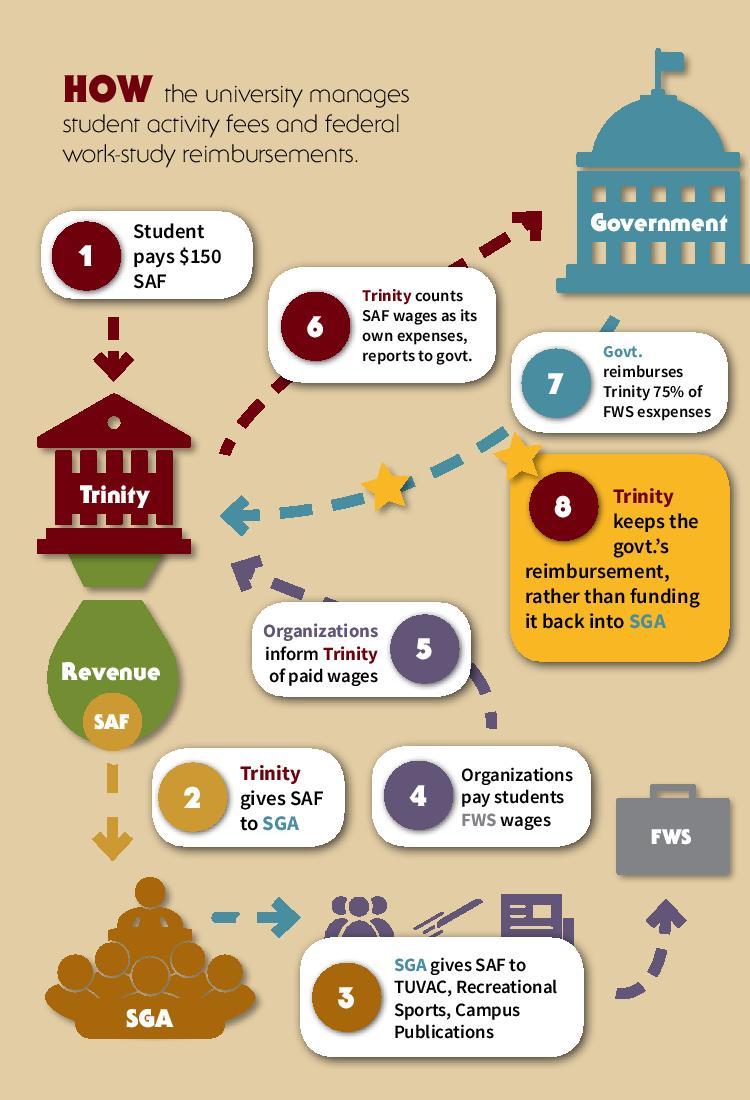By Daniel Conrad and Kathleen Creedon
Students eligible for Federal Work-Study (FWS) jobs who work for Campus Publications, Recreational Sports and TUVAC are being paid with money collected via the student activity fee, but those organizations aren’t seeing the windfall from federal reimbursements on those payments.
Neither is Student Government Association (SGA), which distributes the student activity fee to campus organizations. Instead, the university is retaining savings on these reimbursements. Some advisers and members of the affected organizations have expressed frustration at this arrangement.
Recreational Sports, TUVAC and Campus Publications, which comprises the Trinitonian and the Mirage, present proposals for their annual operating budgets to the SGA senate every spring. The senate distributes funds to these and other student organizations from an SGA-managed pool of money collected each semester from the student activity fee.
“The student activity fee is collected from all undergraduate students at Trinity. It’s $150 per semester; $300 over the total academic year,” said Joseph Khalaf, vice president of SGA. (Khalaf is a member of the Board of Campus Publications, which publishes and supervises the Trinitonian and Mirage.) “96 percent is given to SGA; four percent is retained by the [business] office, and it’s put into the university’s general budget.”
Because the university participates in the FWS program, it receives end-of-year reimbursements from the U.S. Department of Education for payments made to FWS-eligible student workers. Nearly 1,500 Trinity students qualify for FWS positions.
“As long as we’re not spending more than we get, we’re good, and we report that back to the government,” said Diana Heeren, who was hired this April as the associate vice president for finance. “They judge how much they give based on how much we spend.”
Many university departments and offices hire FWS-eligible students with university money, which is mostly raised through donations and student tuition.
But Recreational Sports, TUVAC and Campus Publications pay students with money allocated from the student activity fee and, in the case of Campus Publications, with money generated by students for the Trinitonian and Mirage. In Khalaf’s view, this isn’t the intended use for student activity fee.
“Most people associate [the student activity fee] with tuition, but it’s a separate fund. If the university needed that extra money, then they should consider altering their tuition because they already get the four percent from [the student activity fee],” Khalaf said.
The Trinitonian reached out to the advisers for Recreational Sports and TUVAC, who each directed us to Heeren. Katharine Martin, coordinator for student-edited publications, explained how the situation seems to her. (Martin is the adviser to the Trinitonian and the Mirage.)
“To the university, all money collected from students is the university’s money. Because I see students generating brand new revenue and carefully managing their budgets to sustain important campus publications, I recognize the student activity fee money as part of the university’s commitment to experiential learning,” Martin said. “It’s money collected from students to give them the opportunity to make significant decisions. Through this new process, student groups aren’t losing money; neither are they benefiting. The university is benefiting. It is bringing more money to Trinity, and that is good.”
But Martin says that in her time working for Trinity, she’s never seen the university retain money on payments to FWS-qualified students paid via the student activity fee.
“I’ve been here 15 years, and Campus Publications employees have only ever signed an institutional work agreement,“ Martin said. “Starting this year, they sign a Federal Employment Work Study Request/Authorization [form].”
Heeren disagrees.
“It’s not a change at all. I think there was just an entry that had never happened to hit [Campus Publications] before,” Heeren said.
Martin says this doesn’t square with her experience.
“There is a chance [that this was happening internally]. There absolutely is,” Martin said. “But why did the forms change? Why until this year were Seth [Asbury] and Kristen [Harrison] told, ‘Don’t hire Federal Work Study employees’? Scott Brown says it’s new to him.” Asbury and Harrison advise Recreational Sports; Brown is the adviser for TUVAC.
Khalaf wonders whether these organizations should be offering FWS positions at all.
“I think the Trinitonian, RecSports and TUVAC should have the right to say that they’re not going to participate in this,” Khalaf said. “There’s no benefit for [them] to let the university have the extra funds, and it’s not a small amount.”
Heeren says that the university counts on the reimbursements for budgeting purposes.
’It’s not like we’re keeping [the money from the Department of Education] to do something non-student-related. It’s just that we’ve said, ‘This is part of our budget.’ We know we’re getting that money,” Heeren said.
The issue was brought up during SGA’s Nov. 6 meeting. Senator Ty Tinker, sophomore, expressed concern for using student activity fee funds to pay for student wages.
“I think we should really question why we pay student wages,” Tinker said. “This is my first time hearing this, but it sounds like the money, because it came from the university, technically, should go back to the university.”
Heeren notes that because the student activity fee is collected and managed by the university, it’s within Trinity’s right to keep the savings made from any FWS-eligible students on payroll, whether or not their pay comes from the student activity fee.
“I want to get to the point where SGA, and you, and everyone, says this makes sense and see why it’s being done this way,” Heeren said. “You may not like it, but you understand that’s how business works.”
Nick Santulli, president of SGA, said that he will present a report on the matter in SGA’s next meeting, which will be held on Monday, Nov. 13. John Croxton, senior and SGA senator, agreed to start a dialogue with the administration to see whether SGA can receive a portion of the reimbursements and author an SGA resolution on the matter.
“I think it’s really worth exploring getting the reimbursement back,” Santulli said.







